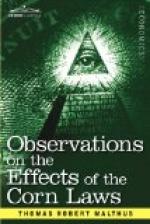It has been sometimes urged as an argument in favour of the corn laws, that the great sums which the country has had to pay for foreign corn during the last twenty years must have been injurious to her resources, and might have been saved by the improvement of our agriculture at home. It might with just as much propriety be urged that we lose every year by our forty millions worth of imports, and that we should gain by diminishing these extravagant purchases. Such a doctrine cannot be maintained without giving up the first and most fundamental principles of all commercial intercourse. No purchase is ever made, either at home or abroad, unless that which is received is, in the estimate of the purchaser, of more value than that which is given; and we may rest quite assured, that we shall never buy corn or any other commodities abroad, if we cannot by so doing supply our wants in a more advantageous manner, and by a smaller quantity of capital, than if we had attempted to raise these commodities at home.
It may indeed occasionally happen that in an unfavourable season, our exchanges with foreign countries may be affected by the necessity of making unusually large purchases of corn; but this is in itself an evil of the slightest consequence, which is soon rectified, and in ordinary times is not more likely to happen, if our average imports were two millions of quarters, than if, on an average, we grew our own consumption.
The unusual demand is in this case the sole cause of the evil, and not the average amount imported. The habit on the part of foreigners of supplying this amount, would on the contrary rather facilitate than impede further supplies; and as all trade is ultimately a trade of barter, and the power of purchasing cannot be permanently extended without an extension of the power of selling, the foreign countries which supplied us with corn would evidently have their power of purchasing our commodities increased, and would thus contribute more effectually to our commercial and manufacturing prosperity.
It has further been intimated by the friends of the corn laws, that by growing our own consumption we shall keep the price of corn within moderate bounds and to a certain degree steady. But this also is an argument which is obviously not tenable; as in our actual situation, it is only by keeping the price of corn up, very considerably above the average of the rest of Europe, that we can possibly be made to grow our own consumption.
A bounty upon exportation in one country, may be considered, in some degree, as a bounty upon production in Europe; and if the growing price of corn in the country where the bounty is granted be not higher than in others, such a premium might obviously after a time have some tendency to create a temporary abundance of corn and a consequent fall in its price. But restrictions upon importation cannot have the slightest tendency of this kind. Their whole effect is to stint the supply of the general market, and to raise, not to lower, the price of corn.




